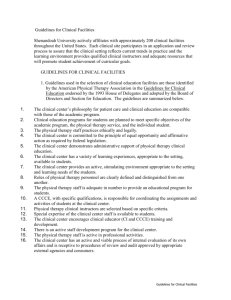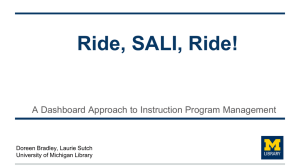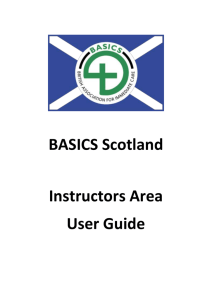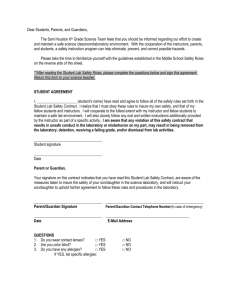Appendix 9
advertisement
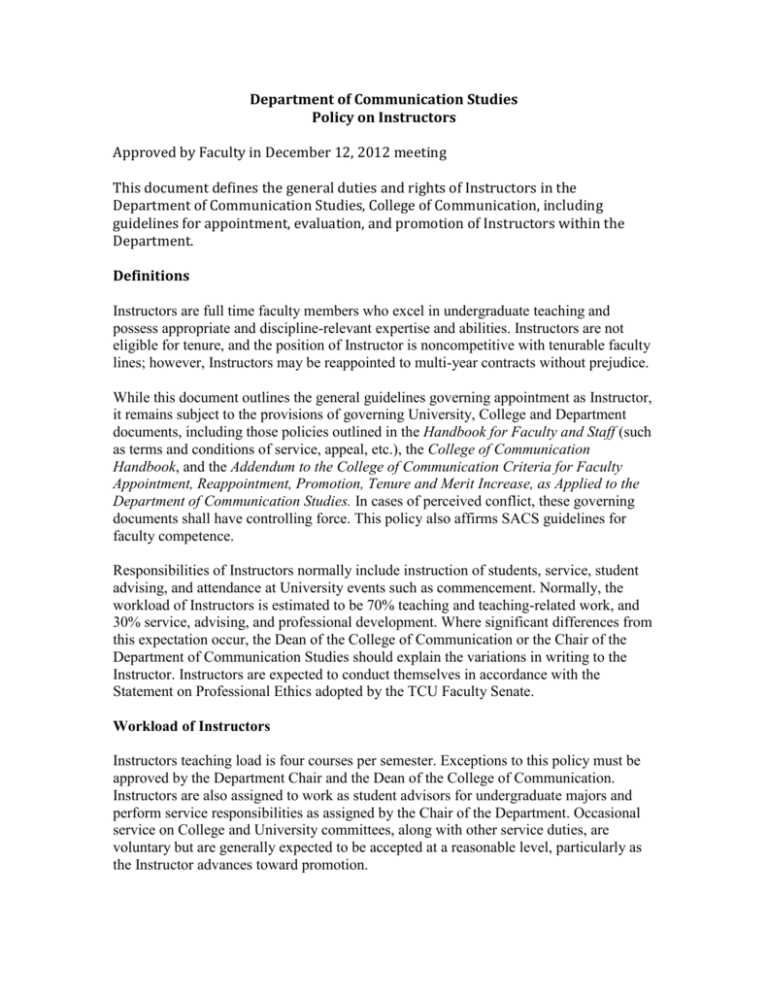
Department of Communication Studies Policy on Instructors Approved by Faculty in December 12, 2012 meeting This document defines the general duties and rights of Instructors in the Department of Communication Studies, College of Communication, including guidelines for appointment, evaluation, and promotion of Instructors within the Department. Definitions Instructors are full time faculty members who excel in undergraduate teaching and possess appropriate and discipline-relevant expertise and abilities. Instructors are not eligible for tenure, and the position of Instructor is noncompetitive with tenurable faculty lines; however, Instructors may be reappointed to multi-year contracts without prejudice. While this document outlines the general guidelines governing appointment as Instructor, it remains subject to the provisions of governing University, College and Department documents, including those policies outlined in the Handbook for Faculty and Staff (such as terms and conditions of service, appeal, etc.), the College of Communication Handbook, and the Addendum to the College of Communication Criteria for Faculty Appointment, Reappointment, Promotion, Tenure and Merit Increase, as Applied to the Department of Communication Studies. In cases of perceived conflict, these governing documents shall have controlling force. This policy also affirms SACS guidelines for faculty competence. Responsibilities of Instructors normally include instruction of students, service, student advising, and attendance at University events such as commencement. Normally, the workload of Instructors is estimated to be 70% teaching and teaching-related work, and 30% service, advising, and professional development. Where significant differences from this expectation occur, the Dean of the College of Communication or the Chair of the Department of Communication Studies should explain the variations in writing to the Instructor. Instructors are expected to conduct themselves in accordance with the Statement on Professional Ethics adopted by the TCU Faculty Senate. Workload of Instructors Instructors teaching load is four courses per semester. Exceptions to this policy must be approved by the Department Chair and the Dean of the College of Communication. Instructors are also assigned to work as student advisors for undergraduate majors and perform service responsibilities as assigned by the Chair of the Department. Occasional service on College and University committees, along with other service duties, are voluntary but are generally expected to be accepted at a reasonable level, particularly as the Instructor advances toward promotion. Appointment and Reappointment All initial appointments to the rank of Instructor are for one year and are made with full participation of the department faculty through the formation of a search committee. The final decision on appointment of Instructors rests with the Department Chair. When emergency appointments must be made (such as immediately prior to the beginning of classes or opus progressum) the Department Chair should consult with faculty to the extent possible and issue a written explanation of the circumstances of appointment and actions taken. Instructors are eligible for continuing reappointment, after review, as outlined in this document. Following an initial one year appointment and review, Instructors may be reappointed for a period of three years. In the third year of this longer contract, a full performance review will occur with the participation of the tenured faculty of the Department. The timelines and procedures of this review will generally follow those outlined for the review of tenurable faculty appointments. As a part of this review process, a set of performance objectives, with benchmarks, will be established by the Instructor and the Department Chair. These objectives are intended to be used as criteria for subsequent performance reviews. Instructors who attain the rank of Senior Instructor can be reviewed every five years and may be issued contracts for five years duration. Finally, all faculty (including Instructors) are subject to annual performance reviews for merit pay evaluation. Should significant problems arise in the performance of duties during any review period (including annual merit pay reviews), the Instructor should be issued a written description of such problems, along with required remedies, and permitted a reasonable opportunity to address the issues of performance deficiency. Deficiencies that are not addressed can result in nonrenewal of contract. Terms of contracts are honored except in cases for dismissal for cause (removal) as outlined in the Handbook for Faculty and Staff or as specified in the contract itself. These contracts stipulate that appointment is on an “at will basis” and may be terminated by the University at any time without notice or cause. It should be clearly noted that there is no obligation, stated or implied, for the University to continue the position, for the contract to be renewed (reappointment to occur) and that the University has the right to make decisions to terminate contracts without notice or cause. Finally, the terms and provisions of TCU’s tenure policy are not applicable to this appointment. The Instructor’s acceptance of the contract must be understood to acknowledge that no claim of de facto tenure is available. Many of these legal issues are spelled out in the contract itself and Instructors are urged to read them carefully before signing. Rights and Privileges of Instructors Instructors may teach any undergraduate course following procedures that respect qualifications, experience, and faculty equity. Class assignments are made by the Chair of the Department but must be based on issues of qualification and equity. Instructors may be called upon to teach graduate courses under some circumstances. Instructors are eligible for appointment to the graduate faculty as associate graduate faculty members (not to be confused with the Associate Instructor rank, discussed later in this document). Instructors shall have access to travel funds as provided in the department travel policy. Instructors are eligible for summer teaching opportunities. Instructors are eligible for teaching in Study Abroad programs. Instructors are to be provided opportunities for merit pay increases with full equity (e.g., based on differing workload but fully competitive). Instructors have a full voice (vote) in issues of faculty governance, save those issues that involve the research mission of the department. This right includes participation in hiring decisions (service on search committees), department committees with the exception of the Department Advisory Committee (as specified in TCU policy), and consultation on matters such as appointment of the Department Chair. Instructors shall have equal access to University family and medical leave policies. Instructors may apply for promotion as outlined in the section below. Associate Instructors and Senior Instructors (see policy below) shall have access to University sabbaticals. These sabbatical opportunities involve proposals related to significant teaching issues (including mentoring, advising, etc.), are subject to rigorous review, and must follow approval procedures normally associated with sabbaticals. In cases involving the performance review of Instructors, Associate and Senior Instructors shall join the tenured faculty in conducting such reviews. Promotion Policy In the sixth year of continuous service at TCU, Instructors may apply for promotion to Associate Instructor rank. The decision to apply for such promotion rests solely with the Instructor and, unlike tenure, is not compulsory. Procedures and timelines generally follow those outlined in tenure policy and in the TCU tenure and promotion review calendar. After promotion to Associate Instructor is awarded, a final promotion to the rank of Senior Instructor is available. Five years must elapse between promotion to Associate Instructor and application for the rank of Senior Instructor. Senior Instructors are eligible for five-year contracts and the review procedures for Senior Instructors follows the procedures for review of tenured faculty, including extension of the review period from three to five years.

